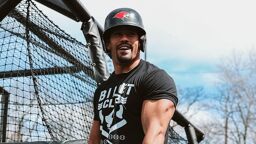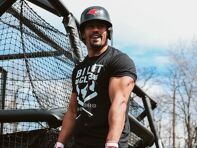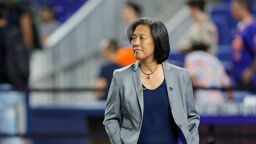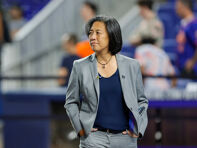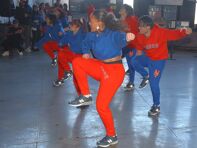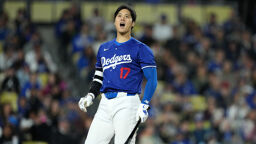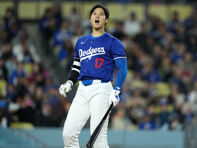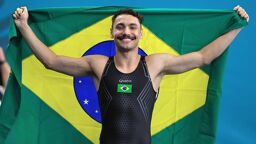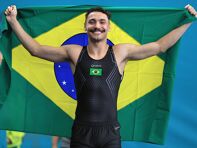When I grew up, the thing I wanted most in life was to be one of the guys.
I started playing team sports when I was 4 years old. It was clear to me even back then that I was different from most of the other boys on my teams. I've always been less muscular and less traditionally masculine. I'm not outwardly aggressive or extroverted by nature, and on a baseball team overflowing with that kind of masculinity, I stood out as different.
I knew personally where some of that “difference” was. I was attracted to other boys in a way I knew my teammates weren’t. Like so many others before me, I kept that very quietly to myself.
Nowhere was this more obvious than when playing baseball. I moved around between club teams growing up, and even though teams I played on repeatedly reached provincial championships, I was never taken seriously by the next team I would play for because I don't present myself as a typically masculine jock.
It wasn't until I turned 16 that I started addressing the negative comments about gay people directed at me. I needed someone on my side when I came out to the team, so I invited one of my teammates who’d been the most outwardly homophobic to go golfing with me.
My plan was to come out to him alone and see how he reacted. It would allow me to gauge how the rest of the team might respond when they found out the guy they'd been calling a “fag” for the last three years actually was gay.
The first half hour we were on the golf course was one of the most stressful of my life. In between talking about how bad our season had been and what we needed to do the following year to improve, he kept up a stream of anti-gay comments about me. My feelings of stress made it difficult to concentrate on my shots, which made him make even more comments about me being gay and a bad athlete.
After a few holes of golf, I asked if we could stop since I was holding everyone on the course back. On the way back to the clubhouse he made a few more wisecracks about me being a terrible athlete because I'm gay, and I realized that the gay comments were never going to end unless I did something about them.
When we sat down at a bench to relax, he said that I golfed like a gay guy. I could hear my heart beating in my chest when I replied.
“I probably play sports like a gay guy because I am a gay guy.”
I expected him to be disgusted, or to start swearing at me. Part of me even expected him to attack me with his golf clubs.
I didn't expect him to fall off the park bench from the shock of me actually being gay. It was in that moment that I realized this teammate of mine who had been tormenting me the most out of everyone wasn't the bigot that I thought he would be. He was a teenager, doing what teenagers sadly do too often to each other.
He apologized repeatedly for everything that he'd said and done over the last three years.
Once he got back on the bench he apologized repeatedly for everything that he'd said and done over the last three years. He said he would never have made any of the comments he made if he had known how much they were hurting me.
In my final two years with the team after that, his support gave me the courage to be a leader on the team and to come out to the rest of the team. I started to play better, knowing that I didn't have to hide such an important part of who I was anymore.
Coming out to my teammates and calling them out for what they had said generated some real respect from my teammates and brought us closer together as a team.
When I'm not playing baseball, I'm curling, and the prospect of coming out to my curling team was even more daunting than the idea of coming out to my baseball team.
For one thing, my curling team was both more competitive and more successful in our competitions. When I was 16, we were provincial qualifiers and routinely attended regional championships. We also had success on the cash bonspiel tour as both a junior and an adult team.
Curling teams are much smaller and more intimate than any other team sport; You can fit the whole team and coaching staff in a minivan and still have room.
I didn't want to ruin the team dynamic that was working so well for us, especially since it was our first year in a new age bracket. By the same token, I was losing focus on the ice and making sloppy errors. I was defensive whenever anyone from the team tried to talk to me.
I realized that this wasn't going to work and it wasn't fair to take my stress out on the team. I already knew that my baseball team took my being gay well, so I should have believed my curling team would be just as supportive.
During one of our unscheduled practices, I took a moment to stop my slides so that I could let the team know. Once I had the other three guys' attention I told them I had something to say, and that it’s something Id' been thinking about telling them for awhile.
“It doesn't matter to us; we just want you to curl at your best.”
When I told the team I was gay, it felt like the whole club went quiet. Curtis, the newest player of the team, piped up.
“Why are you telling us this? It doesn't matter to us; we just want you to curl at your best.”
At the time, I was annoyed with how uninterested they sounded, which made it seem that they didn't support me. It took a couple of weeks for me to realize that was just their way of saying it wasn't an issue.
Word about me being gay spread quickly, since the local curling community is very close-knit. Two years later when my team split apart and I joined a new competitive team out of my home curling club, my new team welcomed me by buying matching pink shirts to be part of the team uniform. Pink was an awful color choice, but I was touched by my new team's willingness to openly support me as a gay athlete.
These days when I curl, it's with rainbow shoe laces and shoe tape, and no one notices, comments or even cares that there's an openly gay curler in one of the most conservative amateur sport cultures in the world.
I'm proud that I still get offers to join competitive teams, and I'm looking forward to taking one of those offers once I have the time to commit to the sport again.
Trevor Ritchie is an incoming graduate student at the University of Northern British Columbia, studying political science. You can reach him via email at [email protected]. He is also on Facebook, and also Twitter.com @tritchieburnaby.

Story editor: Cyd Zeigler





